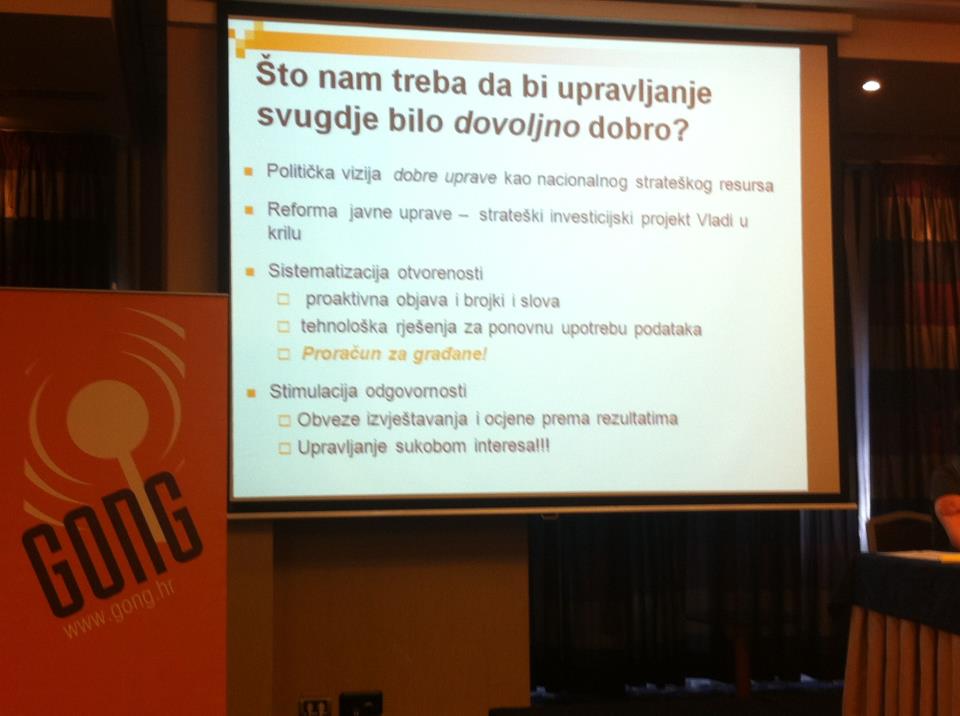What kind of “engineering” of anti-corruption activism do we need, if any? How to expand the circle of actors and policies? How to strengthen the citizen-CSO’s-institutions relationship? How to ensure autonomous, professional and engaged action of the media? How to encourage professional associations and trade unions, and what to do with activism on the local level? What is going on with public financing of the media and what happened with the protection of whistle-blowers? Participants of the thematic discussion “CSO’s, anti-corruption activism and cooperation with institutions” held at the conference “Right to Good Administration in Croatian Practice” organised by GONG, attempted to find answers to these open questions.
Although corruption is a serious problem, we take it too lightly, warned Renato Matić, a sociologist and a member of the GONG Council: “We can be dissatisfied with the citizens as well, and to a large extent, because, we take a serious problem too lightly, and the systematic devastation of professional structures has been going on for past 20 years. A person installed from the “above”, will only be loyal to the person above – this is only human. The ones who are powerless, individuals, activists, media that predominantly approach the topic in a sensationalistic way in order to boost sales, what will they do?”
In the meantime, Matić continued, we are witnessing the beginning of society fascistization, namely, “the others” are pursued – culprits, like civil servants as loafers – guilty for real workers not receiving their payroll. “The arrest of the former prime minister means something on a symbolic level, but for the true combat against corruption it is merely a fig’s leaf. You use a camera to zoom in on a beautiful big fish, but if you zoom in fully, you will not see the whales in the background”.
The media should do their job in order to keep the whales as visible as possible, and to truly protect only the ones who really need it – the weakest ones. However, in reality ,the picture looks diametrically opposite to what it should look like, and Slavica Lukić, a journalist of Jutarnji list newspaper, spoke about that and shared a story with the participants on the process of (non)publishing a story about “privileged pensions granted by all three Croatian presidents.” Although it is an important topic on several levels, only a part of the story was published and in a completely absurd way in the scope of a publishable volume, and the editor asked – what is relevant here?”
(Non)relevant ignoring – finding the path through spectacle
“And that is the way how private media treat this topic and then you realise that you are working with the new generation of editors who are not capable to perceive why this is a story. Therefore, public financing yes, but we should not let go of everything else. The Media Act has been in force for several years now, and it is not respected. Therefore, we should do something with the mainstream media as well, because what we have is not sustainable”, Lukić concluded.
“For you to get noticed by the media, it is important to make a spectacle”, Teodor Celakoski said, from the Pravo na grad (Right to the City) initiative, but he also pointed out the problem of what the civil society is. Namely, it has a statistical predetermination towards the actors, whilst on the other hand there are masses rolling down streets, I speak with no negative connotations. But, now we are witnessing a new way of connecting around specific goals as Varšavska Street, Srđ and the Law on Strategic Investments, where tactical platforms occur through establishment of coalitions which are not usual for certain topics.
Vesna Kesić, a journalist, publicist and external member of the National Council for Monitoring Anti – Corruption Strategy implementation thinks that the media play a key role in creating the distortion of the world. She warned that the traditional role of journalism had disappeared. The journalists do not have capacities and when they do cover something, the only thing that counts is the headline, and even that is not their task, but of some editor. Investigative journalism nowadays becomes the opening of a witch hunt season.”
